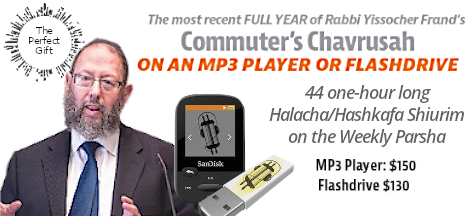Elul / Rosh Hashanah

These divrei Torah were adapted from the hashkafa portion of Rabbi Yissocher Frand’s Commuter Chavrusah Series on the weekly portion: #1393 – The Baal Tokeah Who Could Only Blow From His Left Side and Other Shofar Issues.
The next shiur will be for Parshas Bereishis. Kesiva v’chasima tova & Good Yom Tov!
The Haftorah for the first day of Rosh Hashana is the story of Chana (Shmuel I Chapter 1). Chana was barren for so many years. Finally, she goes up to the Mishkan, receives a bracha from Eli Hakohen and becomes pregnant. Chazal say that she was barren for 19 years and that (according to one Medrash) she was 130 years old when she finally gave birth to Shmuel!
It is most noteworthy that once Eli gave her the bracha, she felt that she did not need to worry anymore. She was so confident in the bracha of Eli Hakohen that she did not go back up to Yerushalayim for aliyah l’regel again. The question is that if she was so confident in Eli’s blessing, why did she not go up to Eli in the first year and ask him for a bracha then? What took her so long?
Rav Elya Baruch Finkel cites an interesting comment from Rav Chaim Kanievsky: The bracha of a tzadik or a talmid chochom is much more effective if the one who bestows the bracha “owes a bracha” to the person who he is blessing! This sense of debt increases his connection to the person seeking the bracha and the bracha thereby becomes much more effective.
That is why the pesukim elaborate on the whole dialog between Chana and Eli. She was mumbling and he mistook her for a drunk woman. She then chastises Eli for his failure to recognize her bitterness of spirit and the fact that she did not consume any wine or strong drink. Chazal likewise find fault with Eli’s initial reaction. They say he was “choshed b’ksheirim” (wrongly suspected the innocent). The halacha is that someone who wrongly suspects an innocent person must bless the person who he wrongly suspected.
Yes, a bracha from any tzadik certainly has significance, but it is extra powerful when that tzadik owes you the bracha. That is why Chana made this case. She could have merely denied the accusation that she was inebriated, but she did more than that. She built the argument that she was wrongly and unjustly accused. Why does she do that? She does that to create indebtedness on the part of Eli. “Eli, you did something terrible. You were choshed b’ksherim. And now I want something from you. I want a bracha.” That type of bracha is the most effective bracha that a person can receive.
Now, what does this do for you and me? People go to Eretz Yisrael. They seek out tzadikim and receive all kind of brachos, left and right. Rav Elya Baruch Finkel makes the point that if a person can somehow make the m’varech (the one bestowing the blessing) indebted to him, the bracha will be much more effective. How a person goes about making a tzadik indebted to him may indeed be difficult, especially when dealing with people who don’t need anything and don’t want anything. But if a person can somehow create that “shibud” (debt) so that the tzadik feels “I owe him,” then the bracha becomes a whole different level of bracha.
Rav Elya Baruch Finkel brings a fascinating incident from many years ago in Europe: A certain person’s great-grandfather (a Rav Halberstam) passed by a non-Jew who was sitting on a bench. The non-Jew said to Rav Halberstam, “It is my birthday today. I am 116 years old. I have four more years!” Rav Halberstam looked at him and said, “How do you know you have four more years?” The man responded, “Not only that, but…” At that point he opened up his mouth and said, “Every one of my teeth are my own. I am 116 years old and I have all my teeth! And I am going to live another four years!”
Rav Halberstam again said, “Very nice. But how do you know that?” The man explained: When I was a little boy, I was a barber’s assistant. I lived in Prague. The Rabbi in Prague at the time was Rav Yechezkel Landau (the Nodeh Beyehudah). When Rabbi Landau came to take his haircut, his custom was to not remove his yarmulka. The haircut was thus to cut around the yarmulka. One time, the Nodeh Beyehudah dozed off during his haircut while sitting in the barber chair and his yarmulka fell off. When he woke up, he noticed that his head was uncovered and he anxiously asked “Where is my yarmulka?” He was upset. The old man told Rabbi Halberstam: “I was a little kid and I found the yarmulka and I gave it back to the Rabbi.” The Nodeh Beyehudah, in gratitude, blessed me and told me: You should live to be 120 and you should never need a doctor.
The blessing came true. The man said “I am 116, I have all my teeth and I have never been to a doctor in my life because I received a blessing from the great rabbi of Prague!” We see what kind of a bracha that was. The Nodeh Beyehudah was very bothered that his head was uncovered so he felt indebted to this little boy for finding his yarmulka.
Rav Elya Baruch then writes a second incident (perhaps a little closer to home): There was a Jew named Rav Elya Yurkanski (1908-2005), who used to be a maggid shiur in the Mir Yeshiva in Brooklyn, New York. He is no longer alive but, in his time, he had the distinction of being the oldest maggid shiur in any American yeshiva. I have a nephew who learned in his shiur when he was past 90! He said over that during World War I, when Rav Chaim Soloveitchik was running for his life (as was the case with many Jews in Eastern Europe at that time), he passed through Minsk. Rav Elya Yurkanski was a young man at the time and he helped Rav Chaim with all of his suitcases and baggage. Rav Chaim gave him a bracha that he should live a long life. Here too, the bracha came to fruition. Once again, a bracha from a tzadik certainly helps, but a bracha from a tzadik who feels a debt of gratitude is a far more effective bracha.
While we are on the subject of brachos, it is not only the bracha of a tzadik that is considered significant but rather chazal say not to underestimate the bracha of (even) an ordinary person. So, I will take this opportunity to wish all my talmidim and readership and their families a kesiva v’chasima tova. I feel indebted to all of you for listening to my shiurim and divrei Torah and therefore may it help that my bracha that Hashem will grant you all a shana tova u’mesuka will be especially effective!
Transcribed by David Twersky; Jerusalem [email protected]
Edited by Dovid Hoffman; Baltimore, MD [email protected]
This week’s write-up is adapted from the hashkafa portion of Rabbi Yissochar Frand’s Commuter Chavrusah Series on the weekly Torah portion. A listing of the halachic portions for Parshas Nitzavim/Vayeilech is provided below:
- # 022 – Reading Haftorah: Scrolls vs. Book
- # 112 – Shoteh: Mental Incompetence in Halacha
- # 158 – Schar Shabbos: How Do We Pay Rabbonim and Chazzanim?
- # 205 – Kiddush Before T’kiyas Shofar
- # 252 – Buying Seforim
- # 295 – Burying the Dead on Yom Tov Sheni
- # 341 – The Brachos on the T’kios
- # 342 – Is Building a Succah a Mitzvah?
- # 385 – Fasting on Rosh Hashana
- # 386 – Succah Gezulah
- # 429 – Treatment of an Invalid Sefer Torah
- # 473 – Seudas Siyum Mesechta
- # 517 – What Exactly Is Mitzva of Shofar
- # 561 – Lo Bashomayin He
- # 605 – Selling A Sefer Torah
- # 649 – Minhagim of the Yomim Noraim
- # 693 – My Father’s Chumros
- # 737 – Borrowing and Lending Seforim
- # 781 – I’m the Baal Tokeah and Not You!
- # 825 – The Shuls of Gaza – A Halachic Perspective
- # 826 – Yom Kippur: Women and the Shehecheyanu; Women and Kor’im
- # 869 – The Mitzvah of Chinuch-Whose Responsibility? Mother or Father?
- # 870 – Yom Kippur – The Yom Kippur That They Did Not Fast
- # 913 – The Tefilah of Oleinu
- # 957 – Coming Late for Tekias Shofar and Other Rosh Hashana Issues
- # 1000 – Ta’amei Hamikra – The Tropp – How Important Is It?
- # 1044 – Must You Stand for Chazoras HaShatz on Rosh Hashana?
- # 1088 – Learning During T’kias Shofer?
- # 1131 – Asking For Personal Needs On Rosh Hashana?
- # 1173 – Oops! I Forgot Ya’Aleh Ve’Yavo in Bentching on Rosh Hashana
- # 1217 – Fascinating Halachos Pertaining to a Choleh on Yom Kippur
- # 1261 – Did I Say Hamelech Hakadosh? / Nuts on Rosh Hashana
- # 1305 – The Case of the Esrog That Was Not As Advertised
- # 1349 – The Baal Tokeah Who Was Doubtful If He Could Blow
- # 1393 – The Baal Tokeah Who Could Only Blow From His Left Side and Other Shofar Issues
- # 1437 – Dip the Apple in the Honey Make A Bracha: Which Bracha?
- # 1481 – Selichos: Can It Be Said Without a Minyan? Sitting Down?
- # 1567 – Returning A Lost Object to an Aino Yehudi
- # 1607 – Lo BaShamayim Hee – Can You Use The Heavens to Pasken Shailos?
A complete catalogue can be ordered from the Yad Yechiel Institute, PO Box 511, Owings Mills MD 21117-0511. Call (410) 358-0416 or e-mail [email protected] or visit http://www.yadyechiel.org/ for further information.


